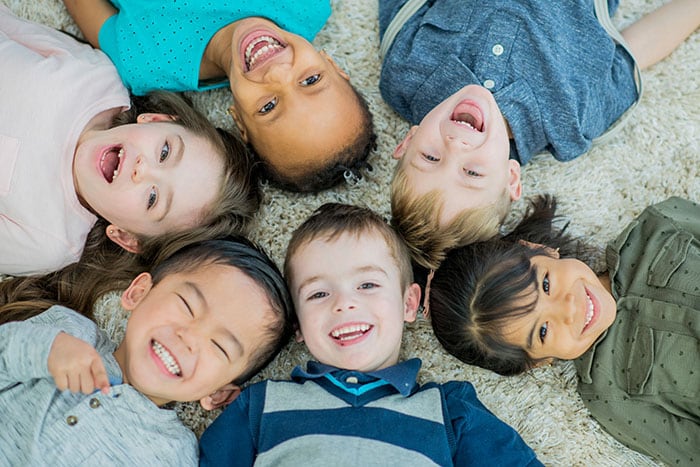Supporting Mental Health in Childhood: The Work of the Children’s Mental Health Champions
Supporting the mental health needs of children starts early in childhood and can have lifelong impacts on overall health and wellbeing. Learn what CDC’s Children’s Mental Health Champions are doing to create partnerships, identify concerns, intervene early, and promote children’s mental health by working with prevention programs in different settings.

Background
Childhood is a critical period that shapes long-term health and well-being, and half of all lifelong mental disorders start by the age of 14 years. To support lifelong mental health, it is important to prevent problems, identify concerns early, and provide effective treatment. Parents, communities, schools, and healthcare providers all play a role in addressing the mental health needs of children to reduce problem behaviors and support child development. Many families face barriers when trying to access evidence-based prevention and intervention programs.
Through a cooperative agreement, the Association of University Centers on Disabilities (AUCD) and the Centers for Disease Control and Prevention (CDC), started the Children’s Mental Health Champions program. The pilot program expanded from 6 Champions in 2020–2021 to 12 champions in 2021–2022. The current 12 Champions work within 11 states and territories as liaisons to CDC’s children’s mental health work and positive parenting resources.
Right now, many professionals work on children’s mental health, but separately, with limited coordination. Building off the successful Act Early Ambassador model, the Champions aim to address the needs of children with or at risk for mental disorders by building the foundation for a stronger, more inclusive mental health system for children.
Goals of the Children’s Mental Health Champions Project
Even before the COVID-19 pandemic, data trends showed that child and adolescent mental health was a significant and growing concern in the US. During the pandemic, children have had to cope with disruptions in learning, healthcare, and daily routines. Many have felt a loss of security and safety, which puts them at additional risk for adverse mental health symptoms. The pandemic has also highlighted disparities in mental health care access among racial and ethnic groups, and among communities with different levels of resources. In December 2021, the US Surgeon General and leading pediatric health organizations declared a children’s mental health crisis.
The Children’s Mental Health Champions address the mental health needs of children and families by supporting one or more of the three pillars of the program:
- Connecting and creating family-school-healthcare-community partnerships.
- Identifying and intervening to ensure early identification and evidence-based treatment of children’s mental health needs.
- Preventing mental disorders and promoting mental health by sharing information and making sure there are prevention programs in multiple settings (such as schools, childcare, and home) to support parents and caregivers.
About the Champions
The Children’s Mental Health Champions have diverse experiences working within children’s mental health settings that include clinical psychology, behavioral therapy, professional counseling, school counseling, early childhood education, and early childhood special education.
The Champions were selected based on their experience with building connections among different parts of the mental health system, their ability to find ways to put evidence-based supports for children’s mental health into practice, and their skills in collaborating with childhood partners to ensure that supports can be sustained and expanded. The Champions are well equipped to navigate the landscape within their state or territory, fostering and encouraging stronger collaboration across their local mental health system.
“Patience is key—everyone is inundated with emails, especially since so much is virtual due to COVID-19. Progress may be slow, [but] it is still progress, which is a win at the end of the day.”
Jazmin Burns, PsyD. – California Champion
“The twists and turns of the pandemic were exceedingly disruptive to school districts and as a result, fewer training[s] were scheduled. However, in closely working with the schools this year to understand the challenges that they experience, I could best tailor the talks to meet their needs.”
Judy Reaven, Ph.D. – Colorado Champion
“The resilience coming out of [the pandemic] is bringing agencies together to better identify the needs of our families and recognizing that the need is so high. The groups are coming together and that is helping [us] move forward to get more professionals to [support] children’s mental health.”
Bethanne Vergean – Connecticut Champion
The Champions’ Projects
The Champions share common program goals, but each has their own approach that best fits the population they serve. With the COVID-19 pandemic introducing new challenges, the Champions had to adapt and change their projects to safely work with their communities. This has brought new challenges—and opportunities—in reaching the communities they serve. Here are a few examples of the projects and challenges from the Champions:
- Pacific Region
- American Samoa: Assist the territory-wide Head Start program so that it can offer screening and referral for students, parents, and program staff who may be affected by trauma.
- Northern California: Increase awareness and use of mental health and school resources among African American families.
- Southern California: Expand the reach of The Incredible Years® program within early childhood education and school programs so more families have access to this evidence-based positive parenting program to support children’s social and emotional well-being.
- Western Region
- Colorado: Increase the ability of school-based providers to screen, identify, and treat children with autism spectrum disorder who also have mental health conditions.
- Montana: Train pediatric providers in the best ways to treat children with developmental disabilities who also have mental health conditions.
- New Mexico: Increase consultation and evaluation services in pediatric clinics to support the mental health needs of infants and young children who may be affected by trauma.
- South Dakota: Promote use of Text4Hope, the statewide crisis text-messaging support for all high school students, in collaboration with the South Dakota Department of Health and the Helpline Center.
- Southern Region
- Georgia: Develop a curriculum for behavior specialists who work in schools so they can support students who have co-occurring mental health and developmental diagnoses.
- Kentucky: Strengthen relationships with childcare providers and provide training resources to support children’s mental health.
- Northeastern Region
- Connecticut: Develop a training program for child welfare social workers on Learn the Signs. Act Early. developmental milestones and children’s mental health, in collaboration with the Connecticut Department of Children and Families.
- Maine: Set up and maintain partnerships within the statewide Early Childhood Professional Learning Community to create a shared vision of health, specifically in the areas of disability, mental health, and equity.
- New Hampshire: Respond to the mental health needs of homeless youth through peer support and resources.
What else is CDC doing?
CDC’s National Center on Birth Defects and Developmental Disabilities (NCBDDD) works to provide a better understanding of children’s mental health so that children and their families get the support they need. To support children’s mental health, CDC has done the following:

- Funded the National Academies of Sciences, Engineering, and Medicine to develop microlearning, graphic novel style tools to promote coping and resilience and help children and youth manage feelings of stress, anxiety, and sadness.
- Developed the Milestone Tracker App to help parents track their child’s developmental milestones, including social/emotional milestones; get tips for encouraging child’s development; and find out what to do if they are ever concerned about their child’s development.
- Published a comprehensive report using data from nine different sources to describe mental health, mental disorders, and mental health treatment in children during 2013–2019 that showed poor mental health among children continues to be a substantial public health concern.
- Created an Opening Playbook for state, territorial, local, and tribal health departments to show ways to use available data—such as attendance, disciplinary actions, and school readiness—to improve child and adolescent mental health.
